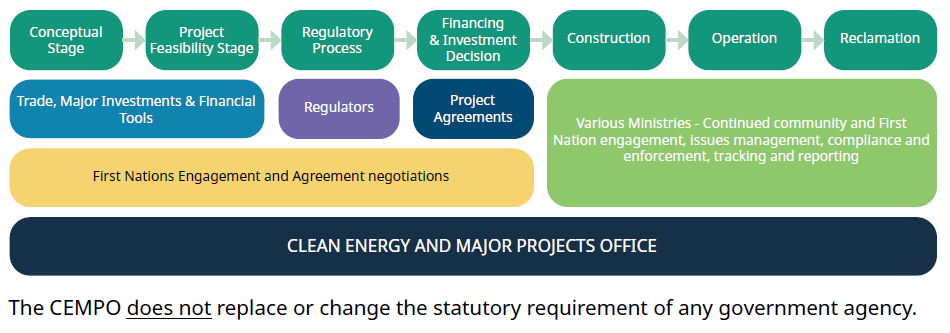Clean Energy and Major Projects Office

The Clean Energy and Major Projects Office (CEMPO) is the main point of contact for proponents looking to bring clean energy projects to British Columbia, as well as for major projects currently underway in the province. The former BC Hydrogen Office is housed within CEMPO.
On this page:
Who we are
The Clean Energy and Major Projects Office (CEMPO) is the primary government liaison for provincial matters related to clean energy and major projects, with responsibility for project management, coordinating inside and outside government to ensure that projects are meeting the Province’s priorities and objectives.
In alignment with the EMLI Minister’s mandate letter, the CEMPO prioritizes the advancement of First Nations interests and First Nations-led clean energy projects, including facilitating partnerships with and benefits for First Nations, such as business opportunities and skills training.
Read the news release to learn more.
Why are we here
- Supporting B.C. as a desirable place for clean energy investment. This includes working with internal and external partners to identify opportunities and challenges in regulatory certainty, competitiveness, access to talented labour and the inputs needed for production for the clean energy sector; and
- Provide specific project management support for projects that need to interface with First Nations, local communities, and government through their development. This would include ensuring the projects are aligned with the Province’s objectives and monitoring them to ensure they result in tangible benefits to B.C.
What we do
The CEMPO offers project management support across the entire life cycle of various projects, encompassing a wide range of sectors, including, but not limited to hydrogen, biofuels, carbon capture, utilization and storage, as well as emerging energy storage technologies.

Please complete the Project Information Form to connect with CEMPO regarding your project.
B.C. Hydrogen Strategy
The B.C. Hydrogen Strategy is our plan to become a leading hydrogen economy. The strategy outlines government’s actions to accelerate the development of B.C.’s hydrogen sector. This will create economic opportunities throughout the province. It will also help reduce emissions and overcome our reliance on fossil fuels.
- B.C. Hydrogen Strategy - Executive Summary (PDF, 1.4MB)
- Download the B.C. Hydrogen Strategy (PDF, 1.4MB)
Publications
B.C. Hydrogen Regulatory Mapping Study (2023)
Carbon Intensity of Hydrogen Production Methods Report (2023)
Northeast B.C. Geological Carbon Capture and Storage Atlas (2023)
B.C. Hydrogen Study (2019)
- Executive Summary (PDF, 9.5MB)
- B.C. Hydrogen Study – Full Report (PDF, 28MB)
- Appendices (PDF, 3.1MB)
Resources
- CEMPO Frequently Asked Questions (FAQ)
- BC-LCFS Requirements
- Clean Transportation Policies and Programs
- CleanBC Industry Fund
- CleanBC Roadmap to 2030 (PDF, 9.2MB)
- Declaration of the Rights of Indigenous Peoples Act Action Plan (PDF, 3.7MB)
- First Nations Major Projects Coalition - Primer for effective Indigenous involvement in BC Environmental Assessments
- Go Electric Hydrogen Fuelling Infrastructure
- Hydrogen Station Permitting Guidebook (PDF, 2.5MB)
- Mandate Letter for the Minister of Energy, Mines and Low Carbon Innovation (PDF, 152KB)
- Opportunities for Hydrogen Co-Products Utilization in British Columbia
- Part 3 Agreements
- Renewable and Low Carbon Fuel Requirements Regulation
- Trade and Invest British Columbia
Contact
Please contact the Clean Energy and Major Projects Office with questions or inquiries about building projects or investing in British Columbia’s clean economy. CEMPO@gov.bc.ca
We acknowledge all Indigenous peoples on whose territories we live, learn and work. We honour their connection to the land and respect the importance of the diverse teachings, practices, customs and traditions within these territories.
